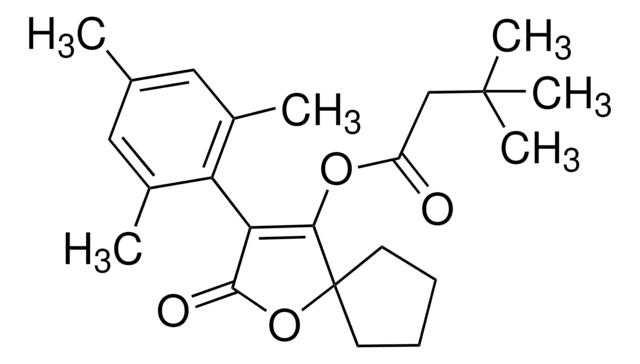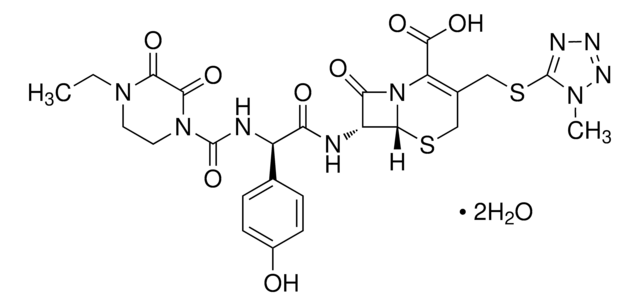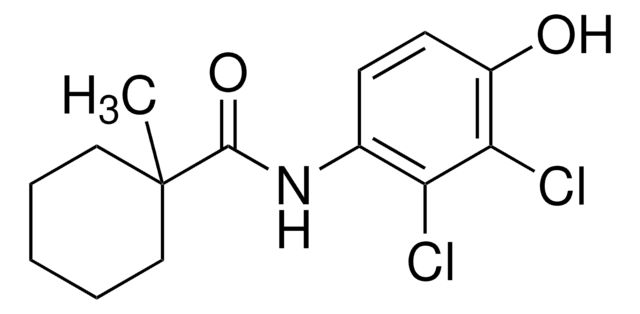CRM03908
Spirodiclofen
certified reference material, TraceCERT®, Manufactured by: Sigma-Aldrich Production GmbH, Switzerland
Synonym(s):
3-(2,4-Dichlorophenyl)-2-oxo-1-oxaspiro[4.5]dec-3-en-4-yl) 2,2-dimethylbutyrate
About This Item
Recommended Products
grade
certified reference material
TraceCERT®
Quality Level
product line
TraceCERT®
form
powder
shelf life
limited shelf life, expiry date on the label
manufacturer/tradename
Manufactured by: Sigma-Aldrich Production GmbH, Switzerland
SMILES string
CCC(C)(C)C(=O)OC1=C(C(=O)OC12CCCCC2)c3ccc(Cl)cc3Cl
InChI
1S/C21H24Cl2O4/c1-4-20(2,3)19(25)26-17-16(14-9-8-13(22)12-15(14)23)18(24)27-21(17)10-6-5-7-11-21/h8-9,12H,4-7,10-11H2,1-3H3
InChI key
DTDSAWVUFPGDMX-UHFFFAOYSA-N
Looking for similar products? Visit Product Comparison Guide
Related Categories
General description
Spirodiclofen is a selective, non-systemic acaricide belonging to the new family of spirocyclic tetronic acids (keto-enols). It is highly active against spider mites, such as Panonychus, Tetranychus, Phyllocoptruta, Brevipalpus, and Aculus species in citrus, pome fruits, grapes, and nuts. Spirodiclofen targets lipid biosynthesis by inhibiting acetyl-coenzyme A carboxylase (ACCase) and it effectively controls the population of mites resistant to other acaricides.
Spirodiclofen has to be monitored in the Multiannual Control Programmes for Pesticides Residues (MACP), run within the EU and EFTA in/on products of plant origin. Maximum residue levels (MRLs) have been set according to Reg (EG) No 2016/1902 for spirodiclofen for various products of plant and animal origin from 0.004 to 2 mg/kg.
Spirodiclofen was initially included in Annex I to Directive 91/414/EEC on 1 August 2010 and is approved under Regulation (EC) No 1107/2009, following Commission Implementing Regulation (EU) No 540/2011. However, after its approval expired on 31 July 2020, Spirodiclofen is no longer approved in the European Union (EU) but is authorized in third countries for use on citrus fruits that might be fed to livestock.
Application
- Study the molecular mechanisms of spirodiclofen resistance using two highly resistant Tetranychus urticae strains with different genetic backgrounds
- To evaluate the sublethal effects of spirodiclofen, abamectin, and pyridaben on life-history traits and life-table parameters of two-spotted spider mites, Tetranychus urticae
- To evaluate the effect of a combination of spirodiclofen with other insecticides for the control of Brevipalpus yothersi in citrus
- Investigate the effects of salicylic acid treatment of tomato plants on the susceptibility of Tetranychus urticae to spirodiclofen, the activities of mite digestive enzymes, and its energy reserves
- Simultaneous determination of spirodiclofen, spiromesifen, and spirotetramat and their metabolites in edible fungi using a modified QuEChERS procedure and UHPLC-MS/MS
Recommended products
Legal Information
Signal Word
Danger
Hazard Statements
Precautionary Statements
Hazard Classifications
Aquatic Chronic 1 - Carc. 1B - Repr. 2 - Skin Sens. 1B - STOT RE 2
Storage Class Code
6.1C - Combustible acute toxic Cat.3 / toxic compounds or compounds which causing chronic effects
WGK
WGK 2
Flash Point(F)
Not applicable
Flash Point(C)
Not applicable
Choose from one of the most recent versions:
Certificates of Analysis (COA)
Don't see the Right Version?
If you require a particular version, you can look up a specific certificate by the Lot or Batch number.
Already Own This Product?
Find documentation for the products that you have recently purchased in the Document Library.
Our team of scientists has experience in all areas of research including Life Science, Material Science, Chemical Synthesis, Chromatography, Analytical and many others.
Contact Technical Service











